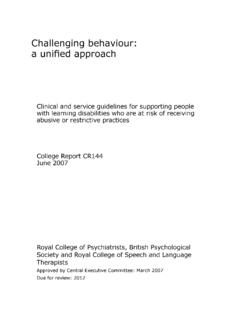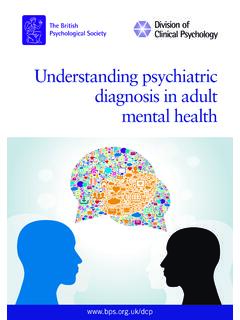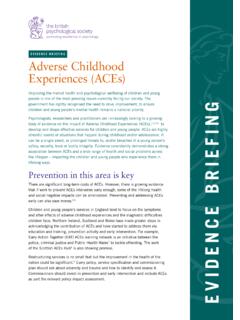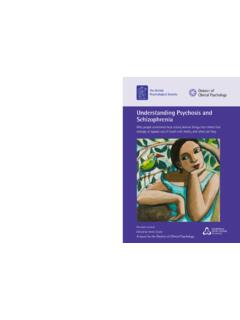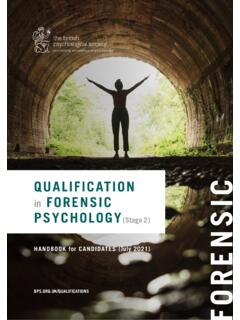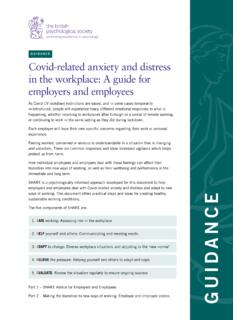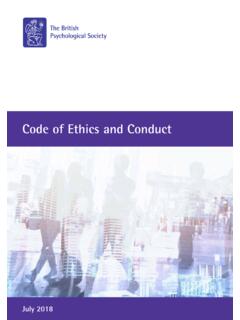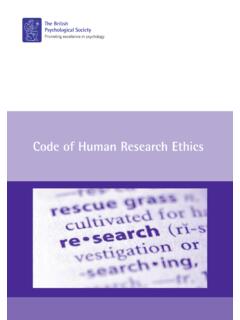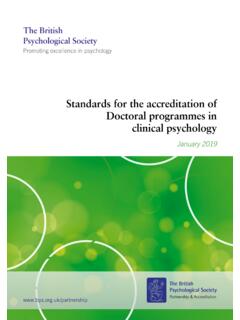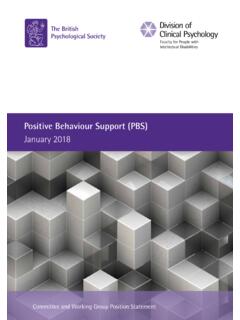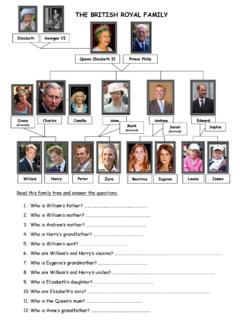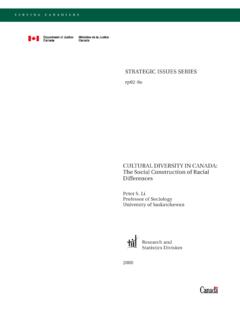Transcription of Guidance on the Assessment and Diagnosis of Intellectual ...
1 Faculty for People with Intellectual DisabilitiesGuidance on the Assessment andDiagnosis of Intellectual Disabilitiesin AdulthoodA document compiled by a Working Group of the british Psychological Society s Division of ClinicalPsychology, Faculty for People with IntellectualDisabilitiesPrinted and published by the british Psychological Society. The british Psychological Society 2015 The british Psychological SocietySt Andrews House, 48 Princess Road East, Leicester LE1 7DR, : 0116 254 9568 Facsimile: 0116 247 0787 Email: Website: by royal Charter Registered Charity No 229642If you have problems reading this document because of a visual impairment and wouldlike it in a different format, please contact us with your specific requirements.
2 Tel: 0116 252 9523; Email: all other enquires please contact the Society on:Tel: 0116 254 9568; Email: of the Working GroupThis document has been prepared by the Faculty for People with Intellectual Disabilities ofthe Division of Clinical Psychology, the british Psychological of the Working Group was as follows:Theresa Joyce (Chair);Ivan Bankhead;Terry Davidson;Susan King;Heather Liddiard;Paul thanks are extended to all those who commented on earlier drafts of thedocument, and all those who attended the workshops as part of the consultation 1: and Wales .. Ireland ..10 Section 2: Defining Intellectual impairment of Intellectual impairment of adaptive behaviour .. of onset prior to adulthood.
3 Of Intellectual disability ..14 Section 3: Assessing Intellectual preliminary information .. appropriate Assessment measures ..16 Measures for the Assessment of Intellectual functioning ..16 Measures for the Assessment of adaptive behaviour .. an Assessment ..19 Factors in the Assessment of Intellectual functioning ..19 Factors in the Assessment of adaptive behaviour ..21 Section 4: Interpreting the results of an judgement .. impairment of Intellectual impairment of adaptive behaviour .. of onset prior to adulthood .. Intellectual need for concurrence of the three criteria ..26 Section 5: Reporting on for information .. and behavioural observations .. administered .. results and , diagnostic impression and recommendations.
4 29 Appendix 1: Intellectual disability and comparable terminology over the 2: The consultation on the Assessment and Diagnosis of Intellectual Disabilities in Adulthood12 Guidance on the Assessment and Diagnosis of Intellectual Disabilities in AdulthoodThis document has been produced as Guidance for clinical psychologists who arefrequently asked to assess whether or not an individual has an Intellectual disability. It willalso be of use to commissioners, colleagues in Intellectual disability services and familiesand individuals who are seeking clarification on this issue. The aim is to outline goodpractice in this area. It also considers the different contexts in which Assessment ofintellectual disability may be relevant, including mental health and mental capacitylegislation, court proceedings, service entitlement and the family disability is defined as significant impairment in Intellectual functioning andsignificant impairment in adaptive behaviour (social functioning), with each of theseimpairments beginning prior to adulthood.
5 In practice, a Diagnosis of Intellectual disabilityis sometimes made without reference to all three criteria and with debate over themeaning of scores on an Assessment of Intellectual functioning (usually known as an IQ test). This has resulted in confusion for families, service users and care providers andconsequent difficulties in ensuring that individuals receive an appropriate document seeks to clarify the components of an Assessment , considers the meaning ofthe scores that are obtained and outlines the means by which psychologists reach theiropinion in relation to whether or not an individual has an Intellectual disability. It providesguidance on technical issues, and notes the difficulties associated with assessing intellectualfunctioning for people who have an Intellectual disability.
6 It also notes the relevance ofpsychologists using their clinical judgement in interpreting complex document recommends specific measures that should be used, and provides guidanceon how findings should be presented. It also notes the importance of ensuring thatassessment is undertaken by an appropriately qualified psychologist. A furtherrecommendation is that a judgement as to whether or not an individual has an intellectualdisability should only be made when all three components of the Assessment are carriedout by an appropriately qualified professional, who is able to justify their opinion inaccordance with this Guidance . This would reduce confusion for individuals, families SummaryThis document has been produced by the Faculty for People with Intellectual Disabilitiesof the Division of Clinical Psychology, the british Psychological Society (the Society), to provide updated Guidance to psychologists registered with the Health and CareProfessions Council (HCPC) who may be required to assess the presence of intellectualdisability, or the extent of Intellectual disability, in adults.
7 Intellectual disability is the termused internationally to describe what was previously known as learning disability. The termintellectual disability will be used throughout this and international definitions of Intellectual disability generally share three keycriteria. These are:la significant impairment of Intellectual functioning;la significant impairment of adaptive behaviour (social functioning); withlboth impairments arising before criteria are embodied in mental health and mental capacity legislation in the UnitedKingdom. They are also evident in the major diagnostic classification systems of theAmerican Association on Intellectual and Developmental Disabilities (AAIDD), theAmerican Psychiatric Association (Diagnostic and Statistical Manual of Mental Disorders, DSM)and the World Health Organisation (International Classification of Diseases, ICD).
8 All three ofthese major diagnostic frameworks have either been recently revised (DSM-5, AAIDD-11)or are in the process of being revised (ICD-11). An increased emphasis has been placed inthese revisions on the importance and appropriate Assessment of adaptive behaviour, butthe basic criteria incorporating limitations in Intellectual and social functioning, withdifficulties arising before adulthood, years have seen increased pressure on services in relation to determining who iseligible to access them, and there are a number of legal frameworks where an intellectualdisability can be a significant consideration in terms of actions, responses and Assessment is, therefore, becoming increasingly has been expressed about the impact of labelling on the lives of people withlearning disabilities.
9 The Society acknowledges that a label, or Diagnosis , can have anegative impact on how people with Intellectual disabilities are perceived and the way theyare treated. However, providing an Assessment of a person's needs, and placing this in thecontext of their need for services, is more likely to be of benefit than a general assessmentwhich does not signpost the way to focused support. One purpose of Assessment anddiagnosis is to assist in the development and provision of appropriate support andinterventions aimed at benefitting the person s functioning and has also been expressed about the use of IQ tests as part of the process ofdetermining whether or not a person has an Intellectual disability. (These are tests ofgeneral Intellectual functioning, so called due to their results typically being expressed interms of an intelligence quotient , or IQ.)
10 There has been considerable scientific debateon the accuracy of IQ testing for people with an Intellectual disability, and there have beenGuidance on the Assessment and Diagnosis of Intellectual Disabilities in Adulthood3 Introduction1A number of different terms have been used over time to describe Intellectual disability. See Appendix 1 for more that the IQ score is of little relevance in this context. The Society s view is that theuse of an IQ Assessment is an essential component of the overall Assessment of intellectualdisability. This is partially to ensure that United Kingdom definitions are in line with internationalorganisations and classification systems ( DSM-5, ICD-10/11, AAIDD-11), and also toassist in recognising and responding to the specific difficulties experienced by persons whohave an Intellectual disability.
